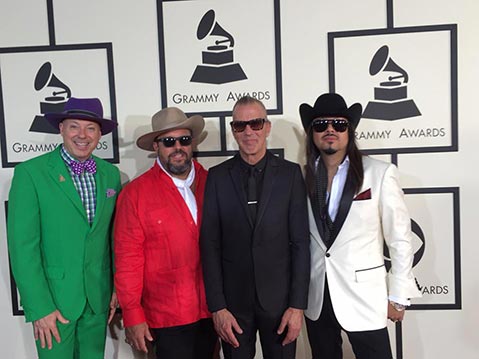The Mavericks Bring Distinctive Country to Chumash
Drummer Paul Deakin Talks Cubano-Latin-Influenced Sound

MONO-PHONIC: Call it a comeback — not a reunion. Since reforming in 2011 after breaking up in 2004, Grammy Award–winning country-by-way-of-Miami band The Mavericks have rolled out two critically and commercially successful albums, winning new fans across the nation with their celebrated live shows. This is no late-career cash-grab from a bunch of restless musicians; this is a certified rebirth. “It feels like a second life,” said drummer Paul Deakin in a recent interview with The Santa Barbara Independent.
When they play their already-sold-out show at the Chumash Casino Resort (3400 E. Hwy. 246, Santa Ynez) Thursday, March 3, at 8 p.m., it will be on the heels of their newest, Mono, which earned Grammy nominations for the Best Americana Album and Best American Roots Song for the single, “All Night Long.” Said single opens the album with an explosive brass line, more Little Havana than Nashville, demonstrating the band’s versatility and the dynamism of their roots. “We grew up in Miami, and those Latin rhythms resonate a lot within this band,” Deakin said. “We’re a very rhythmic band; it’s a hive-mind sound.”
The band first started playing back in the late 1980s South Beach scene, where they famously shared rock venue stages with another up-and-coming Floridian act, one Marilyn Manson. “They called us Johnny Clash,” Deakin recalled of their early days in punk rock bars. It was an interesting time, he said, a brief three- to four-year window when a young band could get noticed in Miami, before South Beach became a known name and leases blew up.
Nowadays, the hugely successful band is taking its distinctive sound on the road with more freedom and “fewer restrictions” than ever, Deakin said. The band is self-managed, which means no label pressures and a self-directed creative course. They are doing better business musically than they ever have, he says, though they are sure not to let the almighty dollar get in the way of the real focus: music.
The last few years have not been without their difficulties, however. The Mavericks had to let go of cofounder and longtime bassist Robert Reynolds due to his out-of-control drug addiction. “It was a dark cloud above us,” Deakin said. “This is my best friend for 25 years. It was hard emotionally, and we did everything we could.” As Reynolds’s role in the band shrunk due to his dysfunctional behavior — “propped up onstage,” and absent on the most recent albums — the group finally forced him to leave.
Yet it would not be truly roots country without some measure of heartache, and the silver lining of such interpersonal dark clouds are the songs that come forth. Singer Raul Malo — whom Deakin calls “the voice of a generation” — is known for his weep-inducing, Roy Orbison-ian voice. On songs such as “From Hell to Paradise,” Malo sings of the wearying struggles faced by immigrants (his parents were Cuban), while on Mono’s “Pardon Me,” he sings of the touring musician’s melancholy and the inevitable post-show comedown.
But for the most part, The Mavericks are a band all about fun. They’ve opened the year with cruise-ship gigs, and the Chumash is but one of many casinos they plan to play in the coming weeks. When asked what their ideal party would include, the rhythmic catador was quick to say: “Tequila. Some music, a little bit of tequila, people having fun — that’s what it’s all about.”



